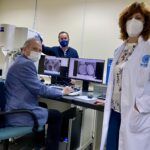The European Commission adopted a Communication on a new European Research Area for Research and Innovation.
Based on excellence, competitive, open and talent-driven, the new European Research Area will improve Europe’s research and innovation landscape, accelerate the EU’s transition towards climate neutrality and digital leadership, support its recovery from the societal and economic impact of the coronavirus crisis, and strengthen its resilience against future crises.
The Commission set out strategic objectives and actions to be implemented in close cooperation with the Member States, in order to prioritise investments and reforms in research and innovation, improve access to excellence for researchers across the EU and enable research results to reach the market and the real economy. Additionally, the Communication will further promote researchers’ mobility, skills and career development opportunities within the EU, gender equality, as well as better access to publicly funded peer-reviewed science.
Launched in 2000, the European Research Area has made major achievements over the past years – yet, today’s context prompts us to rethink how to strengthen its role, better define and implement its key objectives, as well as make it more attractive as a common space for creating valuable research and innovation. Moreover, Europe is currently facing significant societal, ecological and economic challenges that are aggravated by the coronavirus crisis. Research and innovation is therefore crucial in addressing these challenges, delivering on Europe’s recovery and speeding up the twin green and digital transitions.
Objectives of the new European Research Area
La Comunicación define cuatro objetivos estratégicos:
- Prioritise investments and reforms in research and innovation towards the green and digital transition, to support Europe’s recovery and increase competitiveness.
- Improve access to excellent facilities and infrastructures for researchers across the EU.
- Transfer results to the economy to boost business investments and market uptake of research output, as well as foster EU competitiveness and leadership in the global technological setting.
- Strengthen mobility of researchers and free flow of knowledge and technology, through greater cooperation among Member States, to ensure that everyone benefits from research and its results.
The EU will work towards accomplishing the above strategic objectives, in close cooperation with the Member States, through 14 actions that are linked to each other and will be instrumental in realising the European Research Area. Furthermore, the Commission will drive a European Forum for Transition, a strategic discussion forum with Member States that will support them in the coherent implementation of these four objectives. The Commission will also propose, by the first half of 2021, that Member States adopt a Pact for Research and Innovation in Europe, which will reinforce their commitment to shared policies and principles and indicate the areas where they will jointly develop priority actions.
As part of its initiatives to support the recovery and build a green and digital Europe, the Commission, in addition to the new European Research Area, adopted today a new Digital Education Action Plan, to adapt education and training systems to the digital age, as well as a Communication on the European Education Area as a driver for job creation and growth.
More information
Communication on a new European Research Area for Research and Innovation







Leave a Reply